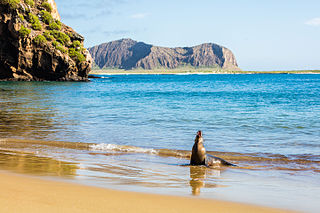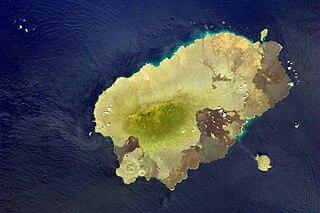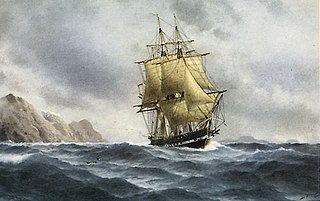Related Research Articles

The Galápagos Islands are an archipelago of volcanic islands in the Eastern Pacific, located around the Equator 900 km (560 mi) west of the mainland of South America. They form the Galápagos Province of the Republic of Ecuador, with a population of slightly over 33,000 (2020). The province is divided into the cantons of San Cristóbal, Santa Cruz, and Isabela, the three most populated islands in the chain. The Galápagos are famous for their large number of endemic species, which were studied by Charles Darwin in the 1830s and inspired his theory of evolution by means of natural selection. All of these islands are protected as part of Ecuador's Galápagos National Park and Marine Reserve.

Ann-Margret Olsson, credited as Ann-Margret, is a Swedish-American actress, singer, and dancer with a career spanning seven decades. Initially gaining notoriety in 1961 as a singer with a sultry, vibrant contralto voice, she quickly rose to Hollywood stardom.
Dorothy Miller Richardson was a British author and journalist. Author of Pilgrimage, a sequence of 13 semi-autobiographical novels published between 1915 and 1967—though Richardson saw them as chapters of one work—she was one of the earliest modernist novelists to use stream of consciousness as a narrative technique. Richardson also emphasises in Pilgrimage the importance and distinct nature of female experiences. The title Pilgrimage alludes not only to "the journey of the artist ... to self-realisation but, more practically, to the discovery of a unique creative form and expression".

The marine iguana, also known as the sea iguana, saltwater iguana, or Galápagos marine iguana, is a species of iguana found only on the Galápagos Islands (Ecuador). Unique among modern lizards, it is a marine reptile that has the ability to forage in the sea for algae, which makes up almost all of its diet. Marine iguanas are the only extant lizard that spends time in a marine environment. Large males are able to dive to find this food source, while females and smaller males feed during low tide in the intertidal zone. They mainly live in colonies on rocky shores where they bask after visiting the relatively cold water or intertidal zone, but can also be seen in marshes, mangrove swamps and beaches. Large males defend territories for a short period, but smaller males have other breeding strategies. After mating, the female digs a nest hole in the soil where she lays her eggs, leaving them to hatch on their own a few months later.

European exploration and settlement of Oceania began in the 16th century, starting with the Spanish (Castilian) landings and shipwrecks in the Mariana Islands, east of the Philippines. This was followed by the Portuguese landing and settling temporarily in some of the Caroline Islands and Papua New Guinea. Several Spanish landings in the Caroline Islands and New Guinea came after. Subsequent rivalry between European colonial powers, trade opportunities and Christian missions drove further European exploration and eventual settlement. After the 17th century Dutch landings in New Zealand and Australia, with no settlement in these lands, the British became the dominant colonial power in the region, establishing settler colonies in what would become Australia and New Zealand, both of which now have majority European-descended populations. States including New Caledonia (Caldoche), Hawaii, French Polynesia, and Norfolk Island also have considerable European populations. Europeans remain a primary ethnic group in much of Oceania, both numerically and economically.

Santiago Island is one of the Galápagos Islands. The island, which consists of two overlapping volcanoes, has an area of 585 square kilometers (226 sq mi) and a maximum altitude of 907 meters (2,976 ft), atop the northwestern shield volcano. The volcano in the island's southeast erupted along a linear fissure and is much lower. The oldest lava flows on the island date back to 750,000 years ago.

Floreana Island is a southern island in Ecuador's Galápagos Archipelago. The island has an area of 173 km2 (67 sq mi). It was formed by volcanic eruption. The island's highest point is Cerro Pajas at 640 m (2,100 ft), which is also the highest point of the volcano like most of the smaller islands of Galápagos. The island has a population of about 100.

José de Villamil or José Villamil (1789–1866) was born in New Orleans, when Louisiana was a colony of Spain. He was one of the fathers of the independence of Ecuador, founder of its navy, "conqueror" and first Governor of the Galápagos Islands and Minister of Foreign Relations. The city of General Villamil Playas is named in honor of him. José de Villamil was the younger brother of Felipe Martin de Villamil (1783–1843).

The Galápagos tortoise or Galápagos giant tortoise is a very large species of tortoise in the genus Chelonoidis. The species comprises 15 subspecies. It is the largest living species of tortoise, and can weigh up to 417 kg (919 lb). They are also the largest extant terrestrial cold-blooded animals (ectotherms).
Johanna Angermeyer, American-born author and artist, is the author of the critically acclaimed My Father's Island: A Galapagos Quest and children's picture books, : "Is Your Mama An Iguana?" and "How The Booby Got Its Feet". An exhibiting artist and lecturer on Ecuador and the Galapagos Islands, the author lived for many decades in the UK but has now moved back to Ecuador.

The Floreana mockingbird or the Charles Island mockingbird, is a species of bird in the family Mimidae. It was endemic to Floreana, one of the Galápagos Islands, but now is found only on two nearby islets, Campeón and Gardner-near-Floreana. The Floreana mockingbird is also known as Darwin's mockingbird, as it was the arguable inspiration for Charles Darwin's work on the origins of species; he noticed distinct differences between them and previous species he had encountered and consequently established the existence of other variants on neighboring islands.
Patrick Watkins was an Irish sailor who was marooned on Floreana, an island of the Galápagos Islands, from 1805 to 1809. He is the first known permanent resident of the Galapagos. According to later accounts, Watkins managed to survive by hunting, growing vegetables, and trading with visiting whalers, before finally stealing an longboat from a whaling ship, impressing five of its crew as his "slaves", and navigating to Guayaquil, Ecuador. Watkins was the only one of the six to survive the journey.

The Galapagos Affair: Satan Came to Eden is a 2013 feature-length documentary directed by Daniel Geller and Dayna Goldfine. It is about a series of unsolved disappearances on the Galapagos island of Floreana in the 1930s among the largely European expatriate residents at the time. The voice cast includes Cate Blanchett, Sebastian Koch, Thomas Kretschmann, Diane Kruger, Connie Nielsen, Josh Radnor and Gustaf Skarsgård.
The Empress of Floreana is a 1934 silent adventure short film made on Floreana Island by a millionaire captain who originally came with a crew to visit the Galápagos Islands for purposes of zoology. The crew chose to visit Floreana because of the rumors that surrounded the island's only two inhabitants, a German diaspora couple Dr. Friedrich Ritter and Dore Strauch, who immediately befriended them to the point where the crew wanted to return every few months with gifts of provisions for their hosts. Upon their second visit, they learned that two more groups joined the island: a family of three with another on the way; and Eloise von Wagner Bosquet, an imperious, self-described baroness who was accompanied by two younger gigolos, Robert and Rudolf, whom she introduced as the architect and engineer of a grand hotel she hoped to build on the island against her fellow islanders' wishes. Von Wagner's charm proved to be so promising, that Captain George Allan Hancock would write a film about her and film it upon their third visit. On January 21, 1934, the crew returned with film equipment to capture the planned production, with many of the ship's members standing in as cast and film crew.

Asilo de la Paz is a location on Floreana Island in the Galapagos archipelago. It is the site of Floreana's first human settlement, and is now among the island's most popular tourist attractions. The site has a maximum elevation of 450 meters above sea level.

Beyond the Islands is a novel by the Ecuadorian writer Alicia Yánez Cossío, published in Quito, Ecuador in 1980. The plot, framed in the genre of magic realism, follows the story of eight people who travel to the Galápagos Islands to escape Death. The work was translated into English in 2011 by Amalia Gladhart.

The Floreana giant tortoise, also known as the Charles Island giant tortoise, is an extinct subspecies of the Galápagos tortoise endemic to the Galápagos archipelago in the equatorial eastern Pacific Ocean. The specific epithet niger (‘black’) probably refers to the colouration of the holotype specimen. The species name has often been misspelled as nigra, an error introduced in the 1980s when Chelonoidis was elevated to genus and mistakenly treated as feminine, an error recognized and fixed in 2017.
Eden is a 2024 American survival thriller film directed by Ron Howard and written by Noah Pink from a story by Pink and Howard. It stars Ana de Armas, Vanessa Kirby, Sydney Sweeney, Jude Law, Daniel Brühl, Felix Kammerer, Toby Wallace and Richard Roxburgh. The movie is based on the true story of a few European settlers coming to Floreana island.

The capture of Manuel Briones was a brief altercation between Swedish and Ecuadorian authorities and the pirates of Manuel Briones who had set out to attack the upcoming Flores expedition.
References
- ↑ Wittmer, Margret (1989). Floreana: a woman's pilgrimage to the Galapagos. ISBN 9781559210010 . Retrieved April 5, 2017.
- ↑ Wittmer, Margret (1989). Floreana: a woman's pilgrimage to the Galapagos. ISBN 9781559210010 . Retrieved April 5, 2017.
- ↑ Woram, John (June 1, 2005). Charles Darwin Slept Here: Tales of Human History at World's End. Rockville Press, Inc. p. 271. ISBN 9780976933601.
- ↑ Stein, Sophia (April 10, 2014). "Uncovering 'The Galapagos Affair: Satan Came to Eden'". Cultural Weekly. Retrieved April 5, 2017.